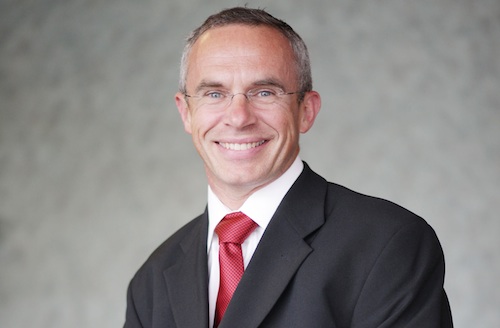
Vodacom could sell its 24,9% stake in iBurst holding company Wireless Business Solutions (WBS) if a technology known as Long-Term Evolution, or LTE, proves more popular than WiMax in providing fourth-generation wireless services.
That’s the word from Vodacom Group CEO Pieter Uys (pictured), who was speaking to TechCentral in Sandton on Monday following the publication of the group’s interim financial results for the six months to September 2009.
Vodacom acquired its first tranche of shares in WBS in 2006 to gain access to the company’s WiMax spectrum. This was because the industry regulator, the Independent Communications Authority of SA (Icasa), signalled at the time that it (Vodacom) would not be entitled to receive this spectrum.
WiMax and LTE are competing technologies in the race to deliver next-generation wireless broadband services. LTE is the evolution of the wideband CDMA network technology that has been deployed in SA by Vodacom and MTN. Wideband CDMA is often referred to simply as 3G, denoting that it’s a third-generation cellular technology.
Vodacom has invested about R100m in building a network of about 100 WiMax base stations on behalf of WBS, Uys says. This is on the understanding that Vodacom will earn a share of revenue from WBS’s WiMax sales. So far, though, those sales are negligible, he says.
Vodacom’s investment in WBS is entirely passive. Uys says lawyers have advised him that Vodacom cannot be operationally involved in WBS because of competition concerns. “We’re hands-off, I don’t ever visit them,” he says.
He concedes, too, that it is unlikely that regulators will allow the cellphone group to increase its stake in the company.
Vodacom will decide what to do with its investment in WBS once there is greater clarity from Icasa about how scarce radio frequency spectrum will be divvied out.
“As the landscape evolves, we’ll review the investment to see if it still fits our strategy,” Uys says. “The hearings around the 2,5GHz spectrum have started and we’ll then review our investment.”
The 2,5GHz band is popularly used for WiMax.
“If LTE takes off, we’ll probably sell iBurst,” Uys says. “If we get the spectrum for LTE, we don’t need WiMax as well.”
Uys says Vodacom is already testing LTE in its lab in Midrand. “The problem is that the handsets aren’t here yet. Right now, an LTE handset is a big box and you can’t really sell that.”
LTE, like WiMax, makes more efficient use of radio frequency spectrum so it’s more cost-effective and can deliver higher data access speeds to end users.
In partnership with Huawei of China, Vodacom has already upgraded more than 1 000 base stations so they are LTE-ready. All that will be required to switch these towers over to LTE is a relatively trivial software upgrade.
“We’ll go live as soon as there is a handset in the market,” Uys says. “They’re talking 2011, but if we’re lucky it could be by the end of next year.” — Duncan McLeod, TechCentral




